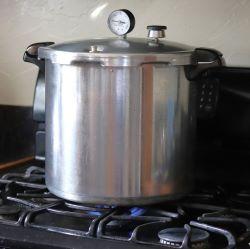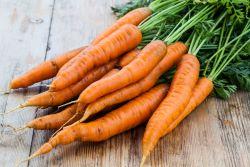Pressure canning is the only recommended method for canning low-acid vegetables. The bacterium Clostridium botulinum is destroyed in low-acid foods when they are processed in a pressure canner at the recommended pounds of pressure and for the correct amount of time. Using boiling water canners for processing low-acid foods poses a real risk of botulism.

When heat is applied to a sealed pressure canner, pressure builds up inside the canner. Water inside the canner forms steam, which replaces the air in the canner. When the vents are closed, only pressurized steam hotter than boiling water remains in the canner. Pressure canners reach an internal temperature of 240°F.
Work quickly and complete the entire process in one session. Raw pack or hot pack vegetables following the directions below. Leave a1-inch headspace from the top of the jar. If desired, add ½ teaspoon salt to pints and 1 teaspoon of salt to quart jars. Salt can safely be omitted from canned vegetables.
Heat vegetables and water, bringing it to a boil for the recommended amount of time. Fill hot jars with hot vegetables; add boiling-hot cooking liquid or boiling water leaving 1-inch head space. Remove air bubbles. Wipe jar rims. Adjust lids and process.
Cover raw vegetables in hot jars with boiling water leaving 1-inch head space. Remove air bubbles. Wipe jar rims. Adjust lids and process.
Pressure Canning Procedures
- Put 2 to 3 inches of water in the bottom of the pressure canner.
- While keeping pre-filled jars upright, place them on a rack at the bottom of the canner.
- Heat the canner to boiling and exhaust steam for 10 minutes before adding the weight or closing the petcock.
- Add weight or pressure regulator.
- Allow pressure to rise and maintain at the level called for in the tested recipe by adjusting the heat. If pressure goes below recommended pressure at any time during processing, reset your timer to zero and restart the entire processing time. Adjust the pressure based on your altitude.
- Dial Gauge Canner* Pressure at Altitudes of 0-2,000 ft.: 11 Lb.
- Weighted Gauge Canner* Pressure at Altitudes of 0-1,000 ft.: 10 Lb.
- After the processing time is complete, remove the canner from heat and allow the canner to cool naturally to 0 pounds of pressure. Wait 2 minutes and remove the weighted gauge or pressure regulator. Wait 10 more minutes before removing the lid.
WARNING: Low-acid vegetables MUST be processed in a pressure canner to minimize the risk of food spoilage and botulism.
*Canning at Higher Altitudes
As altitude increases, water boils at lower temperatures. Therefore, the canning pressure must be adjusted to ensure a safe product. Know your altitude and adjust the amount of pressure accordingly. Visit What is my elevation? for information on determining your altitude. You can also type in “What’s my elevation?” on your Smart phone’s search engine and it will give you the altitude for your exact location.
- Dial Gauge Canner: For altitudes of 2,001 to 4,000 ft. process at 12 lbs. of pressure for the recommended time.
- Weighted Gauge Canner: For altitudes of 1,001 ft. and above process at 15 lbs. of pressure for the recommended time.
It is important to allow steam to escape the pressure canner for 10 minutes before adding the weight or petcock, even if the canner is labeled as “self-exhausting”. This allows the air to be removed from the canner. Air that is trapped in the canner will prevent adequate heating of the jars and may cause the pressure gauge to give a false reading.
For more detailed, research-based information on food preservation, go to the National Center for Home Food Preservation website.

prior to pressure canning.
Asparagus
Preparation: Cut into 1” pieces or can whole.
Hot pack: Cover with boiling water. Boil for 2-3 minutes. Loosely fill hot jars with hot asparagus. Fill jars with boiling water or cooking liquid.
Raw pack: Pack hot jars tightly with raw asparagus. Fill jars with boiling water.
Jar Size and Processing Time: Pints 30 Minutes; Quarts 40 Minutes
Beans (green, snap, wax, or Italian)
Preparation: Wash, trim ends. Leave whole or cut or snap into 1” pieces.
Hot pack: Cover with boiling water, boil 5 minutes. Loosely fill hot jars with hot beans. Fill jars with boiling hot cooking liquid.
Raw pack: Pack hot jars tightly with raw beans. Fill jars with boiling water.
Jar Size and Processing Time: Pints 20 Minutes; Quarts 25 Minutes
Beets (whole, cubed, or sliced)
Preparation: Sort for size. Cut off tops, leaving 1” stem and root. Wash. Cover with boiling water, boil until skins slip off easily. Skin, trim off stem and root. Leave baby beets whole. Cut medium and large beets into ½” cubes or slices. Halve or quarter large slices.
Hot pack: Fill hot jars with hot beets and fresh boiling water.
Jar Size and Processing Time: Pints 30 Minutes; Quarts 35 Minutes
Carrots
Preparation: Wash, peel, & rewash. Slice or dice into uniform pieces.
Hot pack: Cover with boiling water, bring to a boil, simmer 5 minutes. Fill hot jars with hot carrots. Fill jars with boiling water or cooking liquid.
Raw pack: Pack hot jars tightly with raw carrots. Fill jars with boiling water.
Jar Size and Processing Time: Pints 25 Minutes: Quarts 30 Minutes
Corn, Cream Style
Preparation: Husk corn, remove silk, wash. Blanch ears 4 minutes in boiling water. Cut corn from cob at center of kernel then scrape remaining corn from cob with knife.
Hot pack: Add 1 cup of boiling water to each 2 cups of corn. Heat to boiling. Fill hot pint jars with hot corn mixture.
Jar Size and Processing Time: Pints only 85 Minutes
Corn, Whole
Preparation: Husk corn, remove silk, wash. Blanch 3 minutes in boiling water. Cut corn from cob about ¾ depth of kernel. (Do not scrape cob.)
Hot pack: Add 1 cup of boiling water to each 4 cups corn and heat to boiling. Simmer for 5 minutes. Fill hot jars with hot corn. Fill jar with boiling hot cooking liquid.
Raw pack: Pack hot jars with raw kernels. (Don’t shake or press down.) Fill jars with boiling water.
Jar Size and Processing Time: Pints 55 Minutes; Quarts 85 Minutes
Peas, Green
Preparation: Shell and wash peas.
Hot pack: Cover peas with water in a pan. Bring to a rolling boil and boil for 2 minutes. Loosely fill hot jars with hot peas. Fill jar with boiling cooking liquid.
Raw pack: Pack hot jars with raw peas. (Don’t shake or press down.) Fill jar with boiling cooking liquid.
Jar Size and Processing Time: Pint 40 Minutes; Quarts 40 Minutes
Potatoes, white-cubed or whole
Preparation: Wash and peel. Choose potatoes 1-2 inches in diameter for canning whole. Or, if desired, cut into ½” cubes. Place in ascorbic acid solution to prevent darkening (see below). Drain.
Hot pack: Cook whole potatoes for 10 minutes or cubed potatoes for 2 minutes in boiling water. Drain. Fill hot jars with hot potatoes. Fill jars with fresh boiling water.
Jar Size and Processing Time: Pints 35 Minutes; Quarts 40 Minutes
Pumpkin & Winter Squash, Cubed
Preparation: Small, stringless pumpkins such as sugar or pie pumpkins work best. Wash, remove seeds, cut into 1” wide slices, peel. Cut flesh into 1” cubes.
Hot pack: Boil 2 minutes in water. Do not mash or puree. Fill hot jars with hot cubes. Fill jars with boiling cooking liquid.
Jar Size and Processing Time: Pints 55 Minutes; Quarts 90 Minutes
Spinach and other greens
Preparation: Wash freshly harvested leaves until free of grit. Cut out tough stems and midribs.
Hot pack: Steam blanch 1 lb. greens for 3-5 minutes. Loosely fill hot jars with hot greens. Fill jars with fresh boiling water.
Jar Size and Processing time: Pints 70 Minutes; Quarts 90 Minutes
Mixed Vegetables except greens, dried beans, cream-style corn, summer or winter squash, or sweet potatoes
Preparation: Equal portions of carrots, whole kernel sweet corn, cut green beans, lima beans, crushed tomatoes, and cubed zucchini make a good mix. Prepare all vegetables for canning as stated in this fact sheet. Wash, trim and dice zucchini.
Hot Pack: Mix all vegetables together, add boiling water to cover, and bring to a boil. Boil for 5 minutes. Fill hot vegetables into hot jars. Fill jars with boiling water.
Jar Size and Processing Time: Pints 75 Minutes; Quarts 90 Minutes
For answers to your food preservation questions contact our Education Center and Information Line
Ask Questions, Get Ideas
Staff experts, Master Gardeners and Natural Resource Stewards connect you with the resources of the University of New Hampshire.

